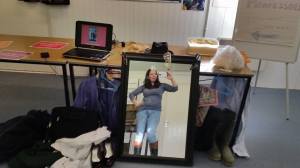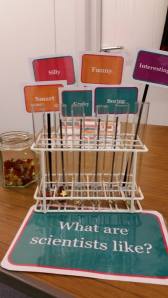For as long as I can remember, I have wanted to be a writer.
As a child, I filled endless notebooks with my stories. They were mostly stories about animals, or thinly veiled replicas of Lord of the Rings. I may even have tried my hand at the odd love story. At school, I kept a private tally of how often my essays were read aloud, or made a teacher cry. I love the written word.
When I was 29 years old, an editor approached me and asked me to write a book. That book, Animal Personalities, is currently available for pre-order.
Of course, when you achieve your childhood dreams, a weight lifts from your heart, a divine confidence settles in your soul, and you never again doubt yourself or your abilities. You become as happy as you always believed you would be . . .
I recently wrote a short case study about being a postdoc for Edinburgh’s “Thriving in Your Research Position” document from the Institute of Academic Development. In the case study, I talk about a spectral figure who has haunted me throughout my whole career: the Perfect Postdoc. She is always better than me. When I wrote my book, she somehow wrote a better one. She’s like a funhouse mirror version of me, and when I change, so does she. I’ll never be able to outdo her.
If you’re a long-term reader of this blog, you’ll know I’ve been thinking about failure lately. I explored my failures as an animal trainer, and meditated on how academia breeds an anti-failure culture. I’m also critical of the idea that all scientists have to be specialists – I’m not a specialist. I’m interdisciplinary and I love it. This leads me to another area of my academic life where the Perfect Postdoc is always one step ahead of me.
The Perfect Postdoc understands R much better than I do. I’ve spoken before on this blog about my frustrations while trying to learn R. While I have taught research methods and statistics for several years now, I’ve always hesitated to teach R. I’ve hesitated because, well . . . because I’m not brilliant at it. My code is ugly and often cobbled together, and I often find the community around R, places like stack exchange and stack overflow, are hideously unfriendly.
I’ve been lucky enough enrol on the Leadership Foundation for Higher Education’s woman-only Aurora programme this year. The first session was called Identity, Impact and Voice, where we explored how we can make a difference in our workplaces and communities. There were two-hundred plus women at the Aurora event in Edinburgh this month, and so many of us spoke about being afraid of ‘not being the best’.
The curious thing is, when I was listing my strengths, I never said I was “the best at [thing]”. My strengths are my communication skills, the fact I’m approachable, and my willingness to try new things. I firmly believe that in five years time anyone who doesn’t have R skills is going to find it very difficult to get a job in academia. Hiding my bad code means I’m not contributing to the R conversation happening right now. I have a voice. And I can have an impact too.
Hadley Wickham, who wrote some fabulous R packages, says:
So with that in mind, I’m going to start sharing my own R teaching materials more widely. You can find my resources on Github (scroll down to find direct links to the exercises). The worst that can happen is that someone tells me my code is ugly. The Perfect Postdoc’s code is of course much prettier, but do you know what? Just like writing my book, writing that exercise was pretty fun.
Glory in your bad code. Glory in saying “I don’t know how to do that” in your local programming club meetings. Glory in your voice. There is nothing else like it.

